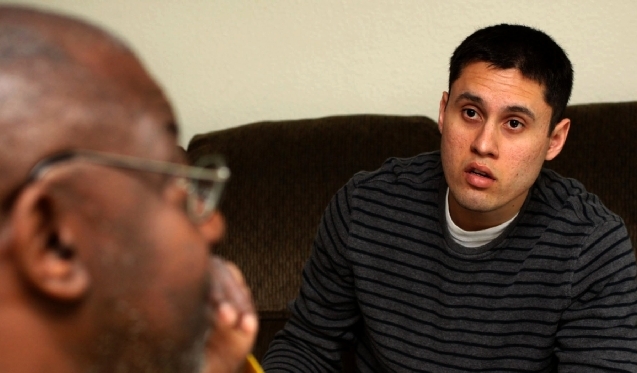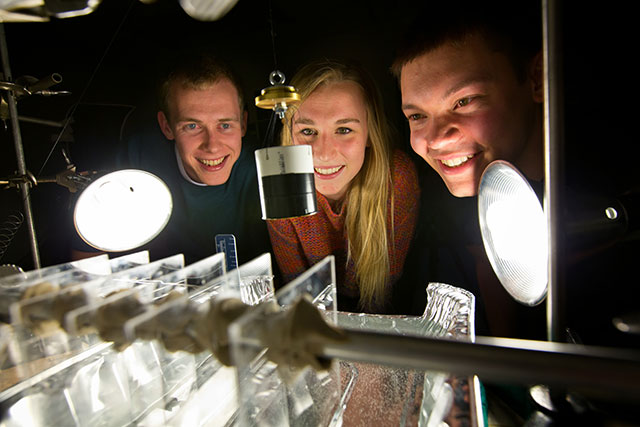Page 68 • (689 results in 0.085 seconds)
-
the results of the feminist study of different language usage by men and women has been the proposal that within a given language there are “genderlects”: patterns of usage based on gender identity (by analogy with “dialects” and “idiolects”). It has been claimed, for example, that in English women command a wider color vocabulary and use different intonation and interrogative patterns than men. The gender patterns in these as well as other areas have not been sufficiently studied in all languages
-

time, both hope they can talk about sports. This report was prepared by Content Development Director Barbara Clements. Comments? Questions? Call her at 253-535-7427. Photography by Gilbert W. Arias. Read Previous New Holocaust Chair at PLU Read Next Lost Boy of Sudan COMMENTS*Note: All comments are moderated If the comments don't appear for you, you might have ad blocker enabled or are currently browsing in a "private" window. LATEST POSTS Three students share how scholarships support them in their
-

.” Although the center’s scope of work has grown following the merger, its core mission remains. “We’re dedicated to supporting faculty, students and staff with the resources necessary to advance PLU’s distinction and vision for global education, a vision that has always assumed the dynamic intersection of the local and global,” she explains. Partnering with departments all over campus, Wang Center staff help provide faculty members with development and grant opportunities, manage and coordinate domestic
-

in 1989, Lander moved to Hong Kong with his future wife, whom he met in China—she was on a similar one-year study abroad program through her UK-based university. After a brief period at the US refugee resettlement program, Lander was hired by the UNHCR (UN High Commissioner for Refugees) where he worked for 20 years, responding to refugee crises around the globe. Along the way, he earned two master’s degrees—one in development management, and another in international humanitarian law and human
-

September 27, 2013 Mark Lee, Mimi Granlund and Matt Hubbard and the apparatus they built to help them understand how the roughness and size of a tongue would affect the amount of water an animal could lap up and still be efficient. (Photos by John Froschauer) What exactly is a ‘CAPSTONE’ (And how will it ge me a job?) By Barbara Clements, Content Development Director So just how does one get a job – or an offer to grad school – by studying slobber? First step: Start studying slobber – or
-

. We asked three Lutes who have each managed to study away multiple times (one even squeezed in seven different programs!) to share about their own experiences.Acadia GrahamJunior (Class of 2020). Hometown: Anchorage, AK Global Studies major, Anthropology and dance minors, Peace Corps Prep program (Youth & Development Track) Involvement: Admission Intern, Global Ambassador for Wang Center for Global and Community Engaged Education, Outdoor Recreation guide Number of times studying away: I’ve
-
people have migrated from China’s rural areas to the cities – the largest internal migration in history. China faces enormous long-term development challenges, including the need to invest more in public health, environmental protection, and education, as well as the need to secure adequate, reliable access to natural resources and energy. Much more than an economic powerhouse, it is also emerging as a political player with high potential to contribute to regional and global stability. The U.S. would
-
two statements stood out for me: “Destiny is just an excuse for bad management,” Foege said in deploring those who believe the world’s current state of affairs is simply the consequence of some natural order. And after celebrating those who share in the excitement and optimism reflected in the new push for global health and development progress, he added a precautionary: “We had better know where we are going.” Tom Paulson ’81 has been a science and medical reporter at the Seattle Post
-
p.m., Scandinavian Cultural Center, Anderson University Center. Monday, March 9: Student/Faculty Dialogue. The Division of the Humanities hosts an open, free-form discussion for students and faculty to share their thoughts and experiences related to race and ethnicity on campus and in the classroom and to identify goals for future programming and curricular development. 7 p.m.-9 p.m., Anderson University Center Room 133. Tuesday, March 17: Dr. Carolyn West: Forum on Ending Sex Trafficking. West
-

viewers to include their own narrative in our work? MORE INFORMATION The People’s Gathering: A Revolution of Consciousness Feb. 24 | All Day | $125-250 | Anderson University Center A professional and personal development to bring our community together to discuss race, equity, and inclusion in the workplace and school environments. MORE INFORMATION Legacy Makers: Historical Narratives on Gender and Sport Feb. 27 | 6:30 p.m. | Anderson University Center (Regency Room) Trailblazers Judy Sweet and Sharon
Do you have any feedback for us? If so, feel free to use our Feedback Form.


